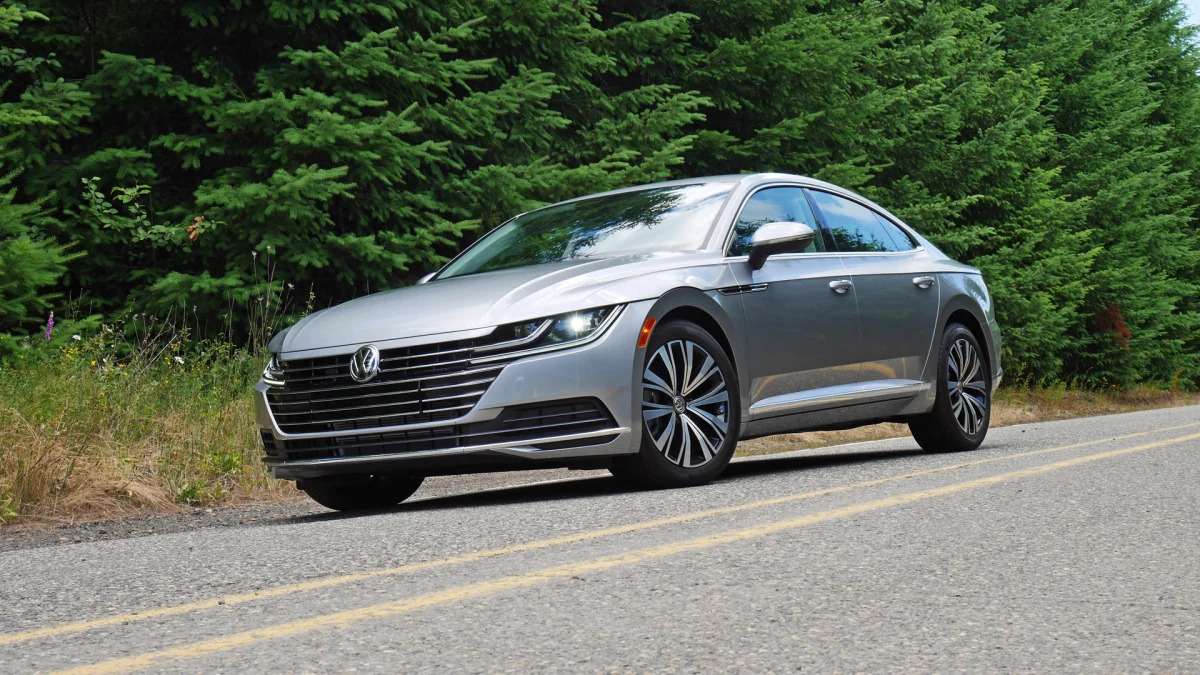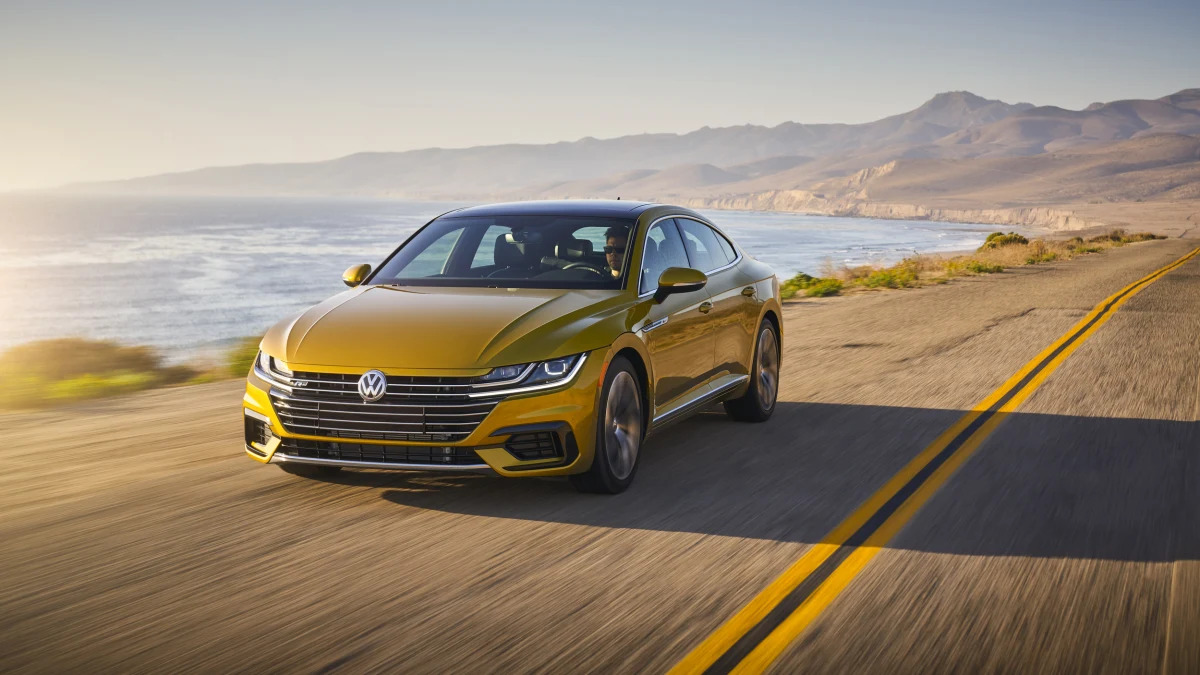Why would you buy a 2019 Volkswagen Arteon? Quite simply, it should be because you love the look. It's low, wide and sleek, with muscular shoulders, a sexy tapered roofline and a refreshing lack of embellishing details. We know from experience that it really turns heads, which definitely can't be said for most similarly sized sedans. Plus, that sexy tapered roofline disguises a useful hatchback trunk and doesn't come at the expense of the surprisingly spacious back seat. The Arteon offers nearly as much function as it does form.
We could see someone falling in love with the Arteon because of these reasons, but there's also plenty to give one pause. For starters, the interior isn't nearly as special – it's all pretty much straight from the VW's parts bin and design catalog. The driving experience can be similarly described, feeling an awful lot like a numb Passat behind the wheel.
Then there's the matter of price. Yes, it costs less than a BMW 4 Series Gran Coupe or Audi A5 Sportback – specifically, a loaded Arteon is about $4,000 cheaper than its similarly equipped Audi corporate cousin. However, the VW's base price is roughly equal to a completely loaded Honda Accord 2.0T and other similarly sized sedans. The Arteon is also generally pricier than the Buick Regal Sportback and Kia Stinger, two vehicles of similar body style, performance and near-luxury positioning. Is its distinctive style, added functionality and Volkswagen badge worth that much? That's ultimately the question one has to answer before bringing one home.
What's new with Arteon for 2020?
The Arteon is an all-new model for 2020, though it replaces the CC atop VW's lineup. You can read a more in-depth look into its design and engineering in our first drive review.

What's the Arteon's interior and in-car technology like?
As much as the Arteon wows with its sleek exterior, the interior is conservative to a fault. While Volkswagen's various parts bin controls and switchgear operate with a rich fluidity, they all come together in a design that just isn't distinctive enough from other Volkswagens. True, there are more soft-touch, squishy surfaces, and the analog clock and vertical strakes disguising the air vents add some pizzazz, but regardless of trim level it provides an illusion of true luxury. That puts it in the same space as a top-of-the-line Honda Accord or 2020 Hyundai Sonata, which are considerably cheaper. Indeed, the similarly priced Kia Stinger's interior looks and feels more like an actual luxury car.
Every Arteon comes with an 8-inch touchscreen, which is a bit low on the dash relative many competitors, but it also works well. We especially like the satellite radio layout that presents large, clear icons for each of your favorites station as well as what they are playing. Standard Apple CarPlay works well with VW's system as well (Android Auto is standard, too). The SEL trim levels include VW's Digital Cockpit, which replaces the instruments with one large display. It's configurable, looks pretty slick when you call up the full navigation map view, and is effectively the same thing Audi sells as its "Virtual Cockpit."


How big is Arteon?
Ultra-sleek sedans like the Arteon have traditionally come attached to a reduction in functionality. We were pleasantly surprised, then, when we climbed into its backseat and found plenty of legroom despite the driver's seat set for someone taller than 6 feet. We were then stunned to find sufficient headroom as well – it's actually similar to an Accord or Toyota Camry.
The trunk is similarly impressive. Open its gaping hatchback lid and find 27.2 cubic-feet of maximum cargo space, which is about 10 more than you'd get in a traditional family sedan. Plus, once you remove the rigid cargo cover and lower the 60/40-split back seat, you'll be able to transport large, boxy objects that don't have a prayer of fitting in one of those sedans. Heck, the Arteon's extended length could even make it more useful for carrying longer objects than some compact SUVs.

What's Arteon's performance and fuel economy?
The Arteon comes standard with a 2.0-liter turbocharged inline-four that produces 268 horsepower and 258 pound-feet of torque. That's more of both than a Buick Regal Sportback or Honda Accord 2.0T, and it has more horsepower than an Audi A5 Sportback.
An eight-speed automatic is standard. Front-wheel drive is included on the base SE, but as that's a limited availability model, most Arteons effectively come with VW's 4Motion all-wheel-drive system.
Fuel economy with 4Motion is 20 mpg city, 27 mpg highway and 23 mpg combined. This is pretty good for an all-wheel-drive car with that much power. The front-drive base car gets 25 mpg combined.

What's Arteon like to drive?
Unfortunately, the Arteon doesn’t feel unique from every other Volkswagen from behind the wheel. The steering is numb on center and when turning in, and its effort feels an awful lot like an elastic band. Selecting one of several driving modes basically just adds tension, creating a SoloFlex feel. This is a real shame, because the Arteon's long, low and wide body is otherwise well suited for tackling a fun road, while its standard adaptive dampers firm up to increase its corner-taking ability or relax to provide a well-damped, comfortable ride.
There's abundant power on hand from the turbocharged inline-four, and it's smartly put to the road thanks to the 4Motion all-wheel drive system. The eight-speed automatic does a very good job of smoothly going through gears, and behaves a bit more normally than VW's DSG automated manual transmission. Only top trims have paddle shifters, however, and the Arteon's Sport mode could be better at downshifting when braking into a corner.
What more can I read about the Volkswagen Arteon?
2019 VW Arteon First Drive
Our first time behind the Arteon's wheel, featuring a deeper dive into its design and engineering.
What are Arteon's safety equipment and crash ratings?
Every Arteon includes eight airbags (front, front-side, front-knee and full-length side-curtain), plus standard forward collision warning with pedestrian detection and automatic emergency braking, blind-spot warning and rear cross-traffic warning. The range-topping SEL Premium R-Line adds active steering assist to the blind-spot system and lane-keeping assist along with adaptive cruise control.
The Arteon had not been crash tested by a third party at the time of this writing.
What features are available and what's Arteon's price?
Pricing technically starts at $36,840, including the $995 destination charge, but that's for the front-wheel-drive SE model that Volkswagen describes as "limited availability." As such, the real base price for most consumers will be $38,640 for the all-wheel drive SE 4Motion.
Standard equipment is generous for a sedan of its size, or even many luxury-branded vehicles of a similar price tag. It includes 18-inch wheels, an adaptive suspension, automatic LED headlights, automatic wipers, various safety and driving aids (seeing Safety section above), proximity entry with push-button start, three-zone automatic climate control, heated eight-way power front seats (with four-way lumbar adjustment), V-Tex premium vinyl upholstery, a leather-wrapped steering wheel, a 60/40-split folding back seat, an 8-inch touchscreen, two USB ports, Apple CarPlay, Android Auto and an eight-speaker sound system with a CD player, and HD and satellite radios. It's also worth pointing out this is the last year for Volkswagen's exceptional warranty: 6 years/72,000-mile for bumper-to-bumper and powertrain coverage.
From there, the $42,790 SEL 4Motion is also limited availability. So the next steps up are the SEL R-Line ($44,555) and SEL Premium R-Line ($47,205), which add sportier "R-Line" styling elements and a variety of extras like leather upholstery, a panoramic sunroof and adaptive cruise control.
These are all well-equipped, but we ultimately think your money is better spent on competitors. For instance, a similarly loaded (though front-wheel-drive) Honda Accord 2.0T costs $36,880. A similarly loaded all-wheel-drive Kia Stinger Premium would be $42,880 (though the 365-hp Stinger GT1 would be about equal to the most expensive Arteon). Meanwhile, a similarly equipped Audi A5 Sportback would be $50,190.
You can find a breakdown of features, specs and local pricing here on Autoblog.











Sign in to post
Please sign in to leave a comment.
Continue